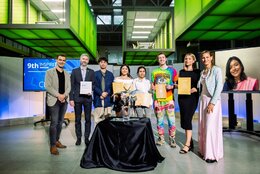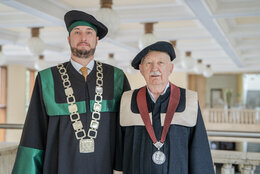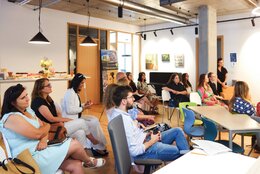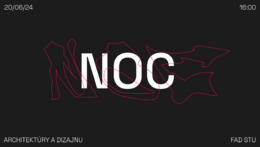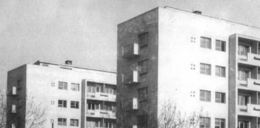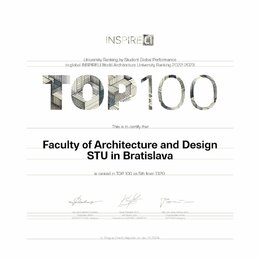Architecture, Culture and Sustainability (A2020)
Robert Špaček, Ján Legény, Peter Morgenstein, Julián Keppl, Klára Macháčová
The main focus of this research group is put on the relationship of architecture and environment. A couple of last years were devoted to the investigation of a solar access design while using the concept of solar envelope and also contemporary ITs as scripts and algorithms. Research group members are primarily focused on reduction of energy demands of buildings, even whole city districts or cities. The research is conducted in the field of energy cooperativeness, utilization of solar appliances as building integrated photovoltaic. The scope of the research is moving from the scale of the single building to complex systems – the city. All those interests are accompanied by research within urban democracy, urban decency, history of the city, smart cities and smart grids or by the concept of crime prevention through environmental design. The preservation and rescue of archaeological and historical monuments or investigating new methods in architectural education plays a specific role in the research.
Tradition and Innovation in Architecture / Materials
Lorant Krajcsovics, Henrich Pifko, Tibor Varga, Lukáš Šíp
The research group focuses mainly on materials and technologies for environment-friendly building operation, basic concepts, life-cycle assessment of buildings or on construction with natural materials (wood, clay, straw, stone), natural insulating materials, modern high-tech alternatives, recycling. Other scopes of research include vegetation roofs and walls, underground architecture, measuring of an impact of materials and technologies on indoor quality of buildings, environmental quality assessment. Technology for the operation of economical and environment-friendly buildings, energy-efficient buildings, architecture design principles linked with the strategy of 2020, use of renewable energy related to architecture, energy and material flows, assessment of energy efficiency, integrated design represent the key fields of research as well.
Digital Technologies in Architecture and Urban Design
Martin Uhrík, Ivor Mečiar, Vladimír Hain, Roman Hajtmanek, Radovan Pekník
The group members are primarily developing a conceptual design skills massing of architecture using computer and digital (parametric) composition. Researchers are focusing on the modeling aspect of forms, possibilities of 3D printing or how to transform digital design into reality. Their outputs introduce the basic principles of 3D printing or how to create high quality 3D models for rapid prototyping. Main IT tools include SketchUp, Rhino, or any 3D modeling programs supporting export to STL files.
Interior Spaces Design
Jana Vinárčiková, Peter Daniel, Michal Hronský, Peter Mazalán, Katarína Morávková, Dušan Kočlík
The research of the group is focused on exploring existing and innovative forms of public, working and residential interior environments in a broader context while reflecting actual design, implementation, technological possibilities, material base, socio-societal context and newly generated users' requirements. Significan thematic areas of conducted research comprise: mapping of preserved cultural heritage in the field of interior design in Slovakia, new possibilities of transformation former works into digital applications, shopping parterre and participative forms of art considered as a part of innovative methods in architectural designing. Overlapping/merging of interior design into the field of artistic disciplines, social sciences and humanities, exploration the concretization of ideological principles and aspects of mutual interaction of spaces and the audience as a result of generating experience, spatial, scenic and sensory effects is a subject of interest as well.
Body Conscious Design (BCD Lab)
Veronika Kotradyová, Ivan Petelen, Andrea Urlandová
The BCD Lab research group is focused on a body conscious design – relationship between human and its environment. Its members are experts in a field of design, architecture, ergonomics, neuroergonomics, social sciences and medicine providing specialised training, lectures, seminars, conferences and workshops. It focuses on human health and the relationship between civilization diseases and the design of the built environment. It explores human responses to the built environment and its elements and focuses on emerging conscious design choices. Other activities are oriented on experimental product design, prototyping and testing.
Design for All (CEDA)
Zuzana Čerešňová, Lea Rollová, Danica Končeková, Pavol Korček, Pavel Nahálka Alexander Schleicher, Kristína Žembery, Milan Andráš
The CEDA research group is focused on human-centered design methods (e.g. Universal Design, Inclusive Design, Design for All, and People-Friendly Design) to create an inclusive environment that accepts human diversity and respects people's individual characteristics also in terms of their psychological and social needs. The research exploits knowledge from the field of neuroscience and environmental psychology to observe and evaluate sensory and emotional responses of people in interaction with the built environment.
Public Buildings, Research by Design, Project & Practice
Jozef Bátor, Pavel Kosnáč, Ján Pavúk
The research group is focused on creative, pedagogical and research-related activities in the field of architectural design of public buildings: administrative, educational, retail, service, transport, public catering, cultural, health care, sports and leisure time buildings. New trends in design of public buildings are the main content of the research and the acquired knowledge is applied in pedagogical and creative activities.
Thinking About Architecture
Vladimír Šimkovič, Pavol Paňák, Martin Kusý, Márius Žitňanský, Michal Bogár
The group consists of architects who have been designing buildings for a long time, but have also always thought about the wider impacts of architecture. It is not a purely theoretical platform, but it rather focuses on other genres as reflections and observations. It sums their long-term experience in condensed forms of expression. Nevertheless, the touch of practice creates interesting insights into broader issues, often presented in the form of articles and books.
These considerations are also reflected in specific architectural designs, whether student or professional.
New Housing Models
Michal Czafík, Andrea Bacová, Branislav Puškár, Zuzana Tóthová, Edita Vráblová, Pavúk Ján, Stanislav Majcher, Ľubica Selcová
The research is linked to new forms of housing in the context of requirements for sustainable development. It focuses on wide typological areas of apartment buildings and their specific forms. Special attention is paid to socially differentiated housing – i.e. rental housing, housing for the elderly but also housing for marginalized groups. The research is linked to key areas across all typological types: related to smart housing concepts and smart technologies, modular housing and conversions improving housing conditions.
The urban development of settlement structures (urban as well as rural) brings the need for research of new strategic forms for suburban development linked to landscape protection, enotourism and hospitality in new spatial conditions. The research group carries out research in close connection with the educational process.
Elements in Modern Building Construction
Eva Vojteková, Eva Oravcová, Ľubica Selcová, Roman Rosina, Katarína Kujanová, Martin Dubiny
The research team is focused on a wide scope of structural, complemantal façade, surfacing exterior and interior elements, presenting a dynamical development in building construction. New elements cover the whole material base from traditional up to progressive composite materials. The research in the sphere of new elements in building construction has to do with their design, architectural and structural detail. The research team cooperates closely with other engineering professions as statics, acoustics, heat- and mass-transfer and day-lighting.
Architecture and Structure Concepts of Production and Engineering Buildings
Ján Ilkovič, Ľubica Ilkovičová, Jozef Baláž, František Kalesný, Yakoub Meziani, Katarína Kujanová, Oľga Ivánková, Eva Vdolečková
The activity of the research team is focused on following fields: the symbiosis of a production and engineering buildings architecture and on the forming of sustainable, architectural structures. The content and the research direction stem from the long-term research group profile with focus on contemporary, intelligent, technology and material determinants in the design of specific building structures. The scope of the research expands on the Industry 4.0, smart concept of production complex and on the green industrial parks. Transformation of old industrial buildings and areas with preservation of their original identity is a relatively independent part of the team investigation. This issue generate a large database for creative approach in design methods.
The important part of research team activity is the application of the new education methods, which encourages a sense for architecture and a creative factor in the architectural structure design from the concept up to the detail by means of didactic maquettes demonstrative modelling.
Cultural Heritage and Monument Restoration (ARCHA)
Katarína Vošková, Pavel Gregor, Pavol Paulíny, Andrej Botek, Nadežda Hrašková, Eva Kráľová, Beáta Polomová
The scientific team focuses on the popularization of the cultural heritage and related scientific artistic disciplines: architecture, visual art, scenography, theatre, film, music and literature. One of the projects has been recognized as one of the activities of the European Cultural Heritage Days by the Ministry of Culture of Slovak Republic The project is held in Banská Štiavnica, inside the historic space of the locality of UNESCO – world heritage site. The aim of the research group is the reflection on the cultural heritage issues in other kinds of visual and audio art.
Theory and History of Architecture
Nina Bartošová, Jarmila Bencová, Henrieta Moravčíková, Matúš Dulla, Jana Pohaničová, Peter Vodrážka, Danica Šoltésová
The research group focuses on history and theory of architecture and urban planning. Historical research comprises a wider range of topics falling within the period of 19th century up to the current times, studying various architectural and urban planning trends, as well as significant personalities and their work, with the aim to strengthen the awareness of local architectural heritage. The research in theory deals mostly with the interpretation of particular trends and phenomenon of European architecture and town planning and criticism of contemporary architecture. Research outcomes are regularly presented to the wider audience via publications, lectures and lecture series, and exhibitions both in Slovakia and abroad.
Urban Design and Land Use Planning
Katarína Fejo, Ľubica Vitková, Katarína Smatanová, Tomáš Hanáček, Viera Joklová
The team focuses on the issue of urban design and planning with emphasis on the principles of sustainability based on transformation of existing structures, mixed-used and optimized development intensity, efficient operation and the support of the local communities (city of short distances, compact city...). The important part of the team research is the quality of urban fabric and public spaces, which is supported by the identity of the urban fabric and the innovative forms of development that meet the changing requirements of society.
Landscape Architecture (CeKA)
Katarína Kristiánová, Eva Putrová, Katarína Gécová
Research at the Centre of Landscape Architecture is dedicated to the long-term issues of landscape architecture and landscape planning achieving the aims of sustainable development, topics of green infrastructure, management of urban green space, aspects of livability and use of nature-based solutions, preservation of values of cultural and natural landscapes, and the issues of rural settlements and rural landscapes. Great focus is put on the investigation of various theoretical and design aspects of planning urban public spaces, reflecting the city users' needs and promoting well being, good health, sustainable use of resources, and provision of ecosystem services, within economic, cultural, and political development. The broad issues of investigation include, e.g. requirements on the design of public spaces in the context of climate change, placemaking, and citizens’ involvement in shaping diverse public spaces, reflecting and interpreting local identities, as well as the current trends of digitization, which influence urban placemaking today. The Centre focuses on the investigation of current factors influencing the contemporary public urban space and change of urban, cultural, and natural landscapes, but also includes studies on history, to understand the changes and the mutual relationship between the past and future. This research orientation is undertaken through several research activities within the projects at the national level and also in international cooperation. The Centre collaborates with the European Council of Landscape Architecture Schools (ECLAS) and LE:NOTRE Institute.
Mobility experience laboratory (MX Lab)
Michala Lipková, Peter Paliatka, Martin Baláž, Peter Olah
The research group focuses on the global technological, social and infrastructural trends in the field of mobility. Through complex speculative design projects the lab challenges the role of an automobile and its possible transformation into a new living and working environment. New technologies, such as virtual reality enable better prototyping and user testing to gain and verify the best user experience. The goal of the laboratory is to contribute to human-centered research in the field of in-car HMI, automotive interior design, mobility services, alternative means of transport and wearable electronics. Equipped with modular mixed reality seatbox, the lab enables dynamic car interior simulation and testing of different mobility scenarios.
Design Education & Product Design & Prototyping
Zuzana Turlíková, Branislav Jelenčík, Tibor Antony, Marián Králik, Peter Humaj, Peter Varga
Business world is finally getting it: Design is the best way to innovate. Creativity, human-centered approach, critical thinking and complex problem-solving are key job skills in upcoming Industry 4.0. Design thinking embraces, offers and cultivates these strategic capabilities of the future. The research group focuses on enhancing the design process and focuses on implementing design thinking principles as key methods and tools in the creative process. The research group further examines also different design methodologies and new prototyping technologies, compares them and fosters interdisciplinary collaboration and teamwork as key elements for innovation. With the broad expertise of its researchers with diverse yet complimentary backgrounds, the research team also predicts and anticipates society and world's changes. Considering and evaluating the new learnings, it includes them into the design process reflecting the ongoing changes in the role of a designer in today's society.
Graphic and Communication Design
Michal Brašeň, Paulína Ebringerová
The research group focuses on monitoring current trends in the field of graphic- and communication design as well as new media. The right use of colours, typography, text, photography and multi-media create complex pictures in overall presentation of product, service or of a designer himself. Design supported by robust marketing strategies and PR makes it a strategic business tool today.
Visual Art
Peter Mazalán, Milan Lukáč, Bohuš Kubinský, Gabriela Gáspárová-Illéšová, Vladimír Petrík, Eva Plotzeková, Michal Šuda, Monika Stacho
The research group focuses in a wide range of artistic practice, especially on the connection of visual arts to architecture. It examines various layers of intermediality in contemporary art and reflects its current trends. It also partially analyzes the influence of art in the field of architecture from the perspective of other sciences.


